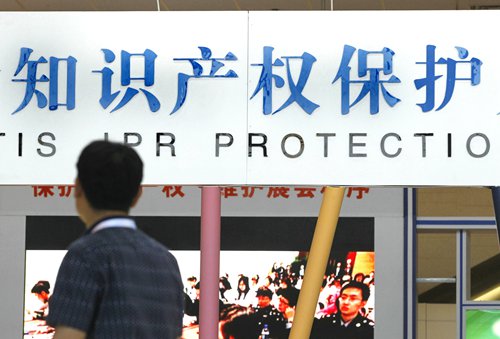
A visitor walks past a signboard on intellectual property rights protection during a trade fair in Beijing on May 29, 2016. Photo: IC
China on Friday unveiled new guidelines for the implementation of its new foreign investment law, providing investors a well-designed protection mechanism that testifies to the nation's open-mindedness toward foreign investment.
More than seven months after the new foreign investment law was passed by the National People's Congress, China's top legislature, a draft guideline on the law's implementation rules was released Friday by the Ministry of Justice, detailing how foreign investors keen on capitalizing on market opportunities in China would be given maximum protection under the nation's legal framework.
A punitive compensation mechanism for intellectual property rights (IPR) infringement would be established to enhance IPR protection for foreign investors and firms, according to the implementation rules which, simultaneously with the new law, will take effect on January 1, 2020.
The draft rules are open for public comment through December 1.
"The punishment mechanism shows how seriously China takes this issue," said Kong Qingjiang, the dean of the School of International Law at the China University of Political Science and Law.
Kong told the Global Times on Friday that some foreign companies still have concerns in areas such as market access and protection of IPR, despite China's slew of measures to further open up and strengthen protection.
The new rules address the core concerns of foreign investors, analysts said.
Administrative bodies should set up a sound internal management system and adopt effective measures to protect the business secrets of foreign businesses that they encounter when fulfilling their duties, according to the draft rules.
If they have to share information with other administrative departments, they need to handle the information containing business secrets accordingly and avoid leakage, unless otherwise stipulated by laws and regulations.
Other than the offering of utmost protection to IPR and business secrets, the rules state that local governments and concerning departments are not allowed to breach contracts they have signed with foreign investors, citing the adjustment of administrative divisions, the reappointment of government officials, among other excuses, unless for national and social interests.
"With the law, and now the implementation rules, it should be sufficiently reassuring for foreign investors, who still had some concerns," Kong said.
The new rules came as China and the US appear to move toward an interim deal to end the costly trade war, which the US waged over a year ago based on claims of unfair treatment of foreign companies in terms of market access and IPR protection.
Kong said that while the trade war helped push for the rollout of the foreign investment law and subsequent guidelines, it was not the main reason. "The main reason is China also needs such a law as part of its reform and opening-up efforts," he said.



